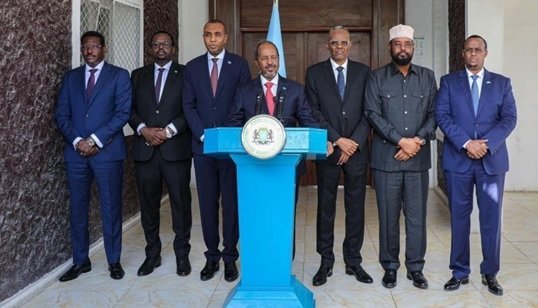By Faisal A. Roble
Somalia’s recovery from its devastating civil war of 1990, which led to the total collapse of what once was the envy of post-colonial Africa, can only be realized by ensuring that the Federal Somali Republic is a constitutional state. Realizing that the constitution is a living document, changes to the original articles and sections is inevitable. However, any change must come through a constitutional process.

Following the 1990 collapse of the former Somali Democratic Republic, the existing draft constitution of 2012 has replaced the 1960 version which was promulgated at the birth of the nation. Preceded by the 2004 Transitional Federal Charter, an 850-member national assembly approved the existing provisional constitution which is the supreme law of the land.
On May 27, 2023, the National Consultative Council (NCC), consisting of the presidents of the Federal Member States, (with the exception Puntland that declined to participate) and the Federal Somali Government (FSG), proposed far-reaching changes to the constitution. Most of the changes have been tabled for some time now and may not create much controversy. A case in point is to commit the country to carry out one-person-one-vote by 2026, which coincided with the term end of the current administration. Moreover, implementing the same expansion of the electoral rights of Somalia’s citizens as prescribed in Article 22 of the draft constitution is a welcome idea to most Somalis. The move is like icing on the cake since the Federal Member State of Puntland has already completed district level direct election whose results are to be released soon.
However, the proposed term extension for some of the presidents of the FMS could lead to a political discord, and the impact of this change is too early to gauge. Many political groups who were waiting in the wings to challenge FMS presidents would be certainly unhappy about this unilateral move.
Turning to the most controversial issue about the changes introduced by the NCC convention, is the proposal of moving Somalia to a Presidential system of government. This op-ed piece is not by any stretch of the imagination debating about the merits or demerits of one system over another. Simply put, it is highlighting the need and centrality of procedural importance in a constitutional republic.
Beginning with the promulgation of the 1960 constitution, Somalia had a parliamentary government where the elected president was largely ceremonial and the premier ran the day-to-day governmental functions. 1969, un constitutional coup suspended the 1960 constitution and formed a military dictatorship with three vice presidents and one supreme and powerful military with the title of Major General. The vice presidents were also generals. Somalis are divided over the legality of the 21-year-old military regime.
If the proposed presidential system of government is legally effectuated, the country would directly elect a president and his/her vice president on one single ticket from the same party. This is a new change which neither the country as whole nor political civic groups debated. Neither did the seated legislator of the nation opine on this consequential change.
So, what to make about the proposed change? First of all, the NCC or the executive body of the country has constitutional rights to propose changes to the constitution. So can the parliament if it so desires. In this case, though, the NCC with the tacit approval of the sitting president, has proposed the said change and sees a possible move to a presidential system of government.
There is no legal grounds for the NCC or the executive body to unilaterally and arbitrarily introduce any change to the constitution. That does not, however, preclude these bodies to propose changes. They either singular or together can propose change. However, such a change can only be processed if and when amendment procedures stipulated in the constitution itself are duly followed.
Are there, then, duly established procedural roadmaps to effectuate constitutional changes or amendments such as moving the country to a presidential system? Yes, there are such procedures and when followed can effectively transform a narrow political proposal into a legal and constitutional instrument.
Schedule one [c] provides for “amendments to the constitution in conformity with agreements negotiated between the Federal Government and the Existing Federal Member States and new Federal Member States, including but not limited to … Article 22, prescribing detailed methods of exercising the right of political participation.
Moreover, a clearly delineated and exhaustive procedural mechanism for amendment to the draft constitution is provided in Chapter 15, sections 3 through 10, including methods and who can table proposals and the necessary public debate and citizen participation to effectuate change to the constitution. In that regard, the NCC or the executive body are expected to honor the amendment process and invoke sections that help the process move forward.
On May 28, 2023, one day after the NCC shared with the nation its intent to change the constitution and move the country to a presidential system of government, president Hassan Sheikh Mahmoud addressed the nation and promised to follow constitutional procedure to ensure these changes are realized.
Finally, neither the draft constitution nor the amendments introduced thereafter are final until a national referendum is conducted per Article 141 of the draft constitution. Therefore, the NCC or/and the executive body is expected in due course to draft all the technical reports arguing for why the changes are needed, when these changes would be debated, and concrete findings to support the need for the proposed change.
Faisal A. Roble
Email: faisalroble19@gmail.com
———–
Faisal Roble, a writer, political analyst and a former Editor-in-Chief of WardheerNews, is mainly interested in the Horn of Africa region. He is currently the Principal Planner for the City of Los Angeles in charge of Master Planning, Economic Development and Project Implementation Division.

Leave a Reply